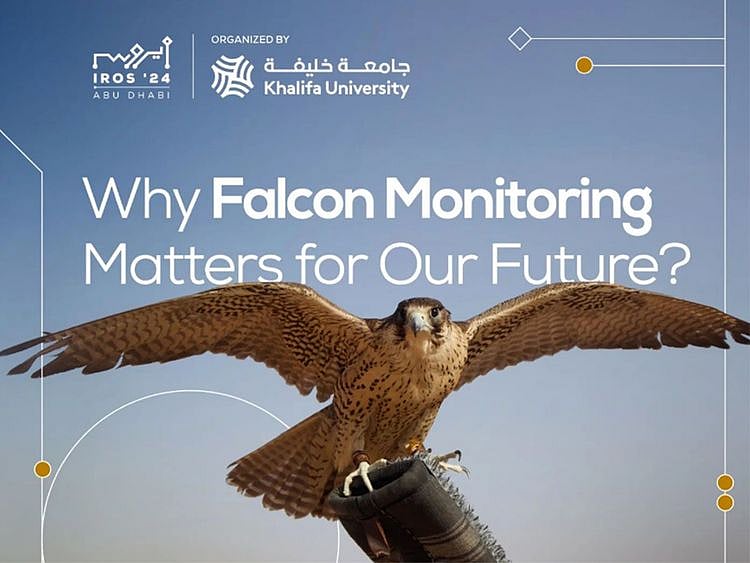In recent years, the field of wildlife conservation has seen advancements driven by technology and artificial intelligence. From drone surveillance to camera traps and data management tools, these innovations are transforming how we monitor and protect endangered species while prioritising non-invasive methods.
In the wild, these advanced techniques must effectively rub shoulders with traditional practices and the people who implement them, ensuring we respect natural habitats.
It is crucial that we recognise this synergy, as a significant gap remains between tech innovators and traditional conservationists — one that the Falcon Monitoring Challenge in the 36th edition of the IEEE/RSJ International Conference on Intelligent Robots and Systems (IROS 2024), in Abu Dhabi — has the potential to bridge.
Traditional conservationists possess invaluable knowledge about ecosystems, species behaviour, and the intricacies of habitat management and their experience is essential for developing effective preservation strategies. Yet, they often operate within constraints, relying on methods that can be outdated or invasive. On the other hand, innovators possess the tools to gather and analyse data, often lacking the ecological context and understanding of wildlife needs.
Falcon Monitoring Challenge
The Falcon Monitoring Challenge, part of IROS 2024 being held from 14-18 October 2024 at the Abu Dhabi National Exhibition Centre (ADNEC), presents a unique opportunity to foster collaboration. By bringing together robotics experts, computer vision specialists, and seasoned conservationists, the challenge encourages a dialogue that can lead to innovative solutions tailored to the needs of wildlife conservation in the UAE and the world.
Participants at the Challenge will design, develop, and deploy sophisticated non-invasive systems to track the movement of falcons, within a large enclosure, promoting innovation in wildlife monitoring technology. The challenge will take place in a purpose-built arena in Abu Dhabi during IROS 2024 where the full challenge includes prototyping the solution with hardware and custom software.
Participants can also take part in a partial challenge where teams or individuals propose custom software using cameras to monitor falcons in realistic and dynamic environments, focusing on precision, innovation, and the ability to analyse complex behaviours.
Leverage cutting-edge technology
The challenge could result in robots designed to track falcons in real-time, which can help wildlife biologists understand the bird’s hunting patterns and social dynamics. Such a partnership can yield technologies that are not only advanced but aligned with the ecological realities that conservationists face every day.
A prime example of this progress can be seen at Khalifa University, which has made significant contributions to wildlife conservation through its innovative research and interdisciplinary approach. Faculty members are actively engaged in projects that leverage cutting-edge technology to monitor ecosystems and protect the houbara species.
By collaborating with the International Fund for Houbara Conservation (IFHC), Khalifa University focuses on scientific research and training including robotics, intelligent systems, genetics and genomics in breeding projects, implementing practical solutions to conservation challenges.
Khalifa University’s commitment to world-class learning and research fosters a new generation of conservationists, equipped with the skills necessary to address the complexities of wildlife preservation in a rapidly changing world.
By allowing tech developers to gain insights into the on-ground challenges faced by conservationists, the challenge also serves as a platform for shared learning through several workshops, seminars, exhibitions and conferences at IROS 2024.
When conservationists are actively involved in the design and implementation of technological tools, they are more likely to advocate for their use and ensure that these innovations are employed ethically and responsibly.
As we face unprecedented biodiversity loss, we must harness the strengths of innovation and traditional methods to create a comprehensive approach to wildlife preservation. The Falcon Monitoring Challenge at IROS 2024 represents a critical step in this direction, and it is imperative we unite these two vital forces for conservation.
Dr Hamad Karki is the Competitions Local Chair at IROS 2024 Competitions Technical Committee and Associate Professor at the Department of Mechanical and Nuclear Engineering, Khalifa University
Sign up for the Daily Briefing
Get the latest news and updates straight to your inbox
Network Links
GN StoreDownload our app
© Al Nisr Publishing LLC 2026. All rights reserved.
